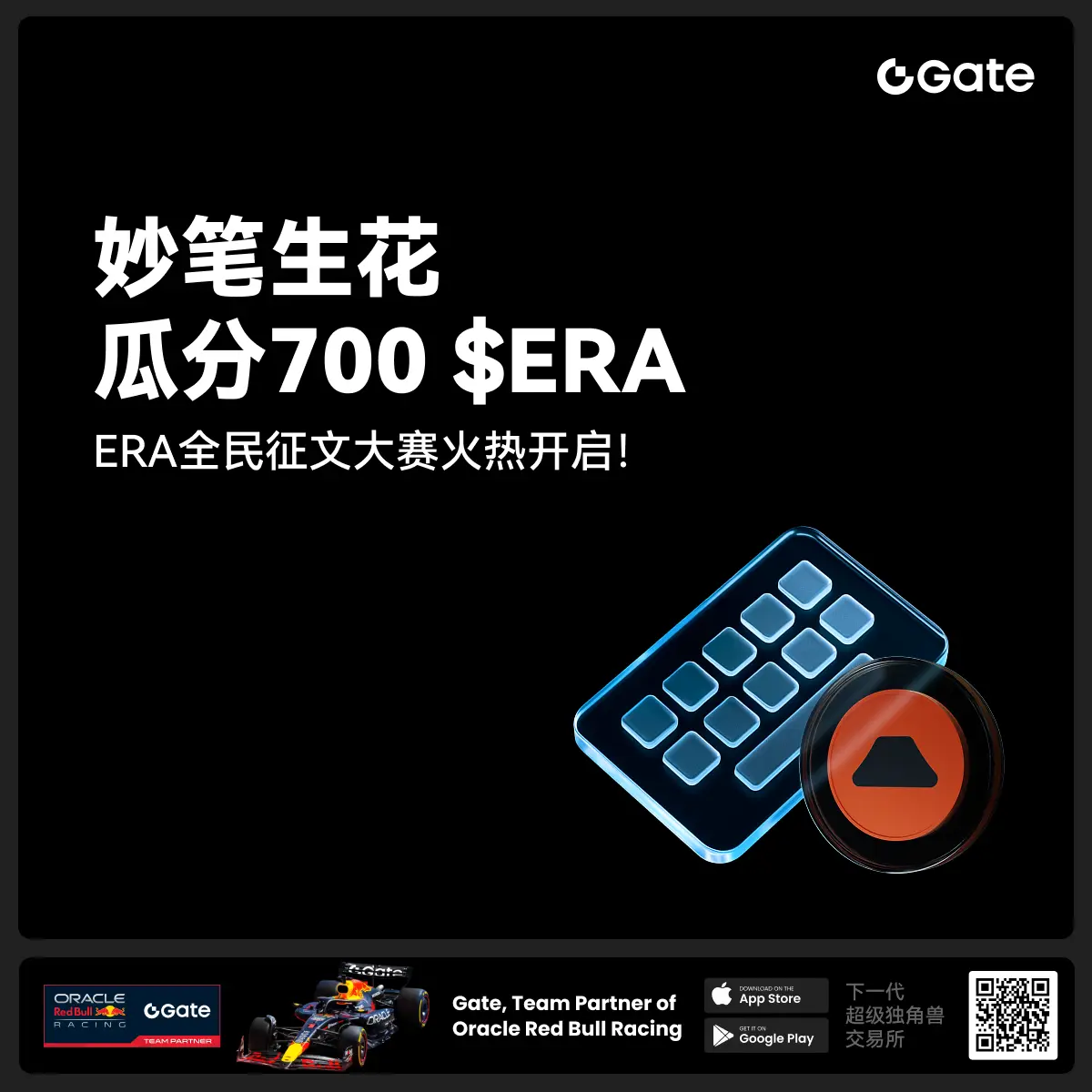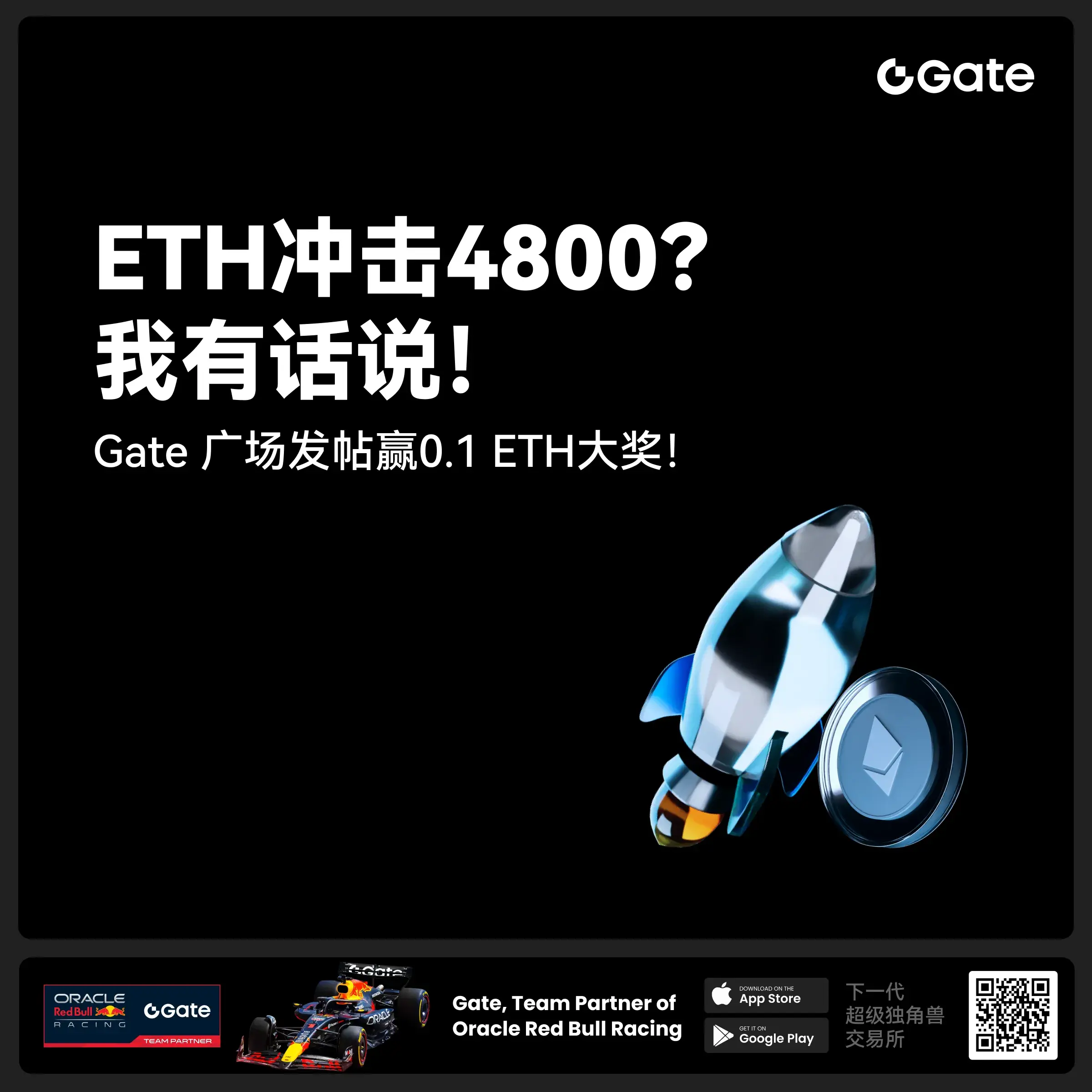更多
- 話題1/3
15782 熱度
3376 熱度
15976 熱度
24281 熱度
15318 熱度
- 置頂
- 🎉Gate 2025 上半年社區盛典:內容達人評選投票火熱進行中 🎉
🏆 誰將成爲前十位 #Gate广场# 內容達人?
投票現已開啓,選出你的心頭好
🎁贏取 iPhone 16 Pro Max、限量週邊等好禮!
📅投票截止:8 月 15 日 10:00(UTC+8)
立即投票: https://www.gate.com/activities/community-vote
活動詳情: https://www.gate.com/announcements/article/45974
- 📢 #Gate广场征文活动第二期# 正式啓動!
分享你對 $ERA 項目的獨特觀點,推廣ERA上線活動, 700 $ERA 等你來贏!
💰 獎勵:
一等獎(1名): 100枚 $ERA
二等獎(5名): 每人 60 枚 $ERA
三等獎(10名): 每人 30 枚 $ERA
👉 參與方式:
1.在 Gate廣場發布你對 ERA 項目的獨到見解貼文
2.在貼文中添加標籤: #Gate广场征文活动第二期# ,貼文字數不低於300字
3.將你的文章或觀點同步到X,加上標籤:Gate Square 和 ERA
4.徵文內容涵蓋但不限於以下創作方向:
ERA 項目亮點:作爲區塊鏈基礎設施公司,ERA 擁有哪些核心優勢?
ERA 代幣經濟模型:如何保障代幣的長期價值及生態可持續發展?
參與並推廣 Gate x Caldera (ERA) 生態周活動。點擊查看活動詳情:https://www.gate.com/announcements/article/46169。
歡迎圍繞上述主題,或從其他獨特視角提出您的見解與建議。
⚠️ 活動要求:
原創內容,至少 300 字, 重復或抄襲內容將被淘汰。
不得使用 #Gate广场征文活动第二期# 和 #ERA# 以外的任何標籤。
每篇文章必須獲得 至少3個互動,否則無法獲得獎勵
鼓勵圖文並茂、深度分析,觀點獨到。
⏰ 活動時間:2025年7月20日 17
- 📢 ETH衝擊4800?我有話說!快來“Gate廣場”秀操作,0.1 ETH大獎等你拿!
牛市預言家,可能下一個就是你!想讓你的觀點成爲廣場熱搜、贏下ETH大獎?現在就是機會!
💰️ 廣場5位優質發帖用戶+X瀏覽量前5發帖用戶,瓜分0.1 ETH!
🎮 活動怎麼玩,0門檻瓜分ETH!
1.話題不服來辯!
帶 #ETH冲击4800# 和 #ETH# 在 廣場 或 K線ETH下 圍繞一下主題展開討論:
-ETH是否有望突破4800?
-你看好ETH的原因是什麼?
-你的ETH持倉策略是?
-ETH能否引領下一輪牛市?
2. X平台同步嗨
在X平台發帖討論,記得帶 #GateSquare# 和 #ETH冲击4800# 標籤!
把你X返連結提交以下表單以瓜分大獎:https://www.gate.com/questionnaire/6896
✨發帖要求:
-內容須原創,字數不少於100字,且帶活動指定標籤
-配圖、行情截圖、分析看法加分,圖文並茂更易精選
-禁止AI寫手和灌水刷屏,一旦發現取消獎勵資格
-觀點鮮明、邏輯清晰,越有料越好!
關注ETH風向,創造觀點價值,從廣場發帖開始!下一個牛市“預言家”,可能就是你!🦾🏆
⏰ 活動時間:2025年7月18日 16:00 - 2025年7月28日 23:59(UTC+8)
【立即發帖】 展現你的真知灼見,贏取屬於你的ETH大獎!
- 🎉【Gate 3000萬紀念】曬出我的Gate時刻,解鎖限量好禮!
Gate用戶突破3000萬!這不僅是數字,更是我們共同的故事。
還記得第一次開通帳號的激動,搶購成功的喜悅,或陪伴你的Gate週邊嗎?
📸 參與 #我的Gate时刻# ,在Gate廣場曬出你的故事,一起見證下一個3000萬!
✅ 參與方式:
1️⃣ 帶話題 #我的Gate时刻# ,發布包含Gate元素的照片或視頻
2️⃣ 搭配你的Gate故事、祝福或感言更佳
3️⃣ 分享至Twitter(X)可參與瀏覽量前10額外獎勵
推特回鏈請填表單:https://www.gate.com/questionnaire/6872
🎁 獨家獎勵:
🏆 創意大獎(3名):Gate × F1紅牛聯名賽車模型一輛
👕 共創紀念獎(10名): 國際米蘭同款球員衛衣
🥇 參與獎(50名):Gate 品牌抱枕
📣 分享獎(10名):Twitter前10瀏覽量,送Gate × 國米小夜燈!
*海外用戶紅牛聯名賽車折合爲 $200 合約體驗券,國米同款球衣折合爲 $50 合約體驗券,國米小夜燈折合爲 $30 合約體驗券,品牌抱枕折合爲 $20 合約體驗券發放
🧠 創意提示:不限元素內容風格,曬圖帶有如Gate logo、Gate色彩、週邊產品、GT圖案、活動紀念品、活動現場圖等均可參與!
活動截止於7月25日 24:00 UTC+8
3
對孟巖同志的一些批評:少談些主義,多解決些問題
Author: Liu Honglin
Some criticisms of Comrade Meng Yan.
Today, Comrade Meng Yan published a long and eloquent article, expressing his emotion over the passage of the GENIUS Act by the United States, saying that this was the Bretton Woods Conference and the Nixon Shock in modern monetary history, and asserting that the "super-sovereign network" of the US dollar stablecoin has already incorporated the world into its system, and other countries are facing the beginning of a battle to defend their monetary sovereignty.
The article is moving, magnificent and broad-minded. I was a little dazed when I read it, as if I saw a prophet who had traveled through two centuries and was worried about the future of the entire human financial system.
But after calming down, I can't help but ask: Who did you write this article for?
If you are writing for the Chinese government, then you may have underestimated the country's strategic investment in blockchain in recent years. Since 2019, when the central bank proposed "blockchain as an important breakthrough for independent innovation of core technologies", it has promoted the implementation of DC/EP while clarifying the importance of blockchain from an institutional level; distributed ledger platforms with state-owned backgrounds have emerged in an endless stream, and alliance chains and industrial chain projects have blossomed everywhere.
Admittedly, not every project is reliable, but the accusation of "ignoring blockchain and falling behind" is probably not true.
If it is written for the industry, especially Chinese Internet entrepreneurs, it is even more unreasonable. Chinese Internet companies have never stopped exploring the direction of Web3 in recent years: NFT, public chain, wallet, and the entire metaverse... They have tried all kinds of things and suffered heavy losses. But at least they have never been absent. The reality is that under the double pressure of compliance restrictions and vague overseas policies, the paths that can really move from experimentation to implementation and from products to applications are very limited. We can criticize execution and vague sense of direction, but you can't say that they are not doing it.
If anyone really needs to say sorry to blockchain, it should be those financial scams that use the name of blockchain.
In the end, the person who was most moved by this article might be the author himself. He lamented that "blockchain needs to be understood again", lamented that "we once missed the opportunity", and even hoped to "say sorry to blockchain" - it sounded sincere and emotional.
But the question is: If one really loves this land as deeply and affectionately as the article expresses, shouldn't one get involved, work in the fields, and build it in a positive direction?
It is so easy to discuss philosophy from across an ocean.
I am not against criticism, nor am I against creating pressure at the level of public opinion, and I am not even against expressing some emotions occasionally. However, the development of the industry has never been driven by one or two emotional articles, but by those who work silently in the field and lay the infrastructure slowly.
"Talk less about theories and solve more problems" is what the industry needs most now.
The real question has never been "Are we aware of this technological revolution?" but "Do we have a way to make this revolution safe, practical and reliable within the existing institutional environment?"
This is the difficulty.
Many of the phenomena mentioned in the article, such as the slowdown in the pace of the Australian central bank after the pilot, the vacillation of Singapore's policies, and the reluctance to implement internal deductions by Wall Street banks, don't they indicate that this is not a "procrastination disease unique to China", but a global problem of complex game between technology and regulation, innovation and order?
Given all this background, it would be too hasty to attribute everything to "pretending to be asleep" or "collective misjudgment of technology."
In our industry, too many people have used "sentiments" to package their own views. Today they talk about currency revolution, tomorrow they talk about sovereignty challenges, and the day after tomorrow they talk about the transformation of civilization. But if you really ask: Are you a product developer? Or a compliance developer? Or a low-level developer? Many people do nothing. At most, they receive a few friends who work on the blockchain in the Bay Area, watch a few overseas conferences, and then come back to write an article about "The Strategic Lack of Global Governance."
This article is not without value. It makes more people aware of the international geopolitical significance of the US dollar stablecoin, which is a good thing. But if it is really as the article says, with the country and the people in mind, then I hope to do something practical like many entrepreneurs who quietly set up compliant exchanges and compliant stablecoins in Hong Kong, and like the technical teams that are working on on-chain payment infrastructure, even if it is just a small step.
Because what this industry lacks most is never articles, but applications; not shouting, but systems; not emotions, but construction.
Say sorry to blockchain? It is better to say thank you to the developers who are still working and those who are willing to start positive businesses.
We can't waste any more time on self-indulgent sentimentality.